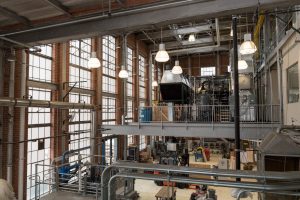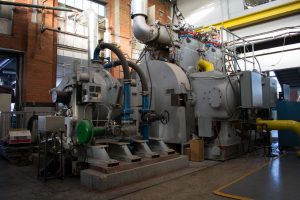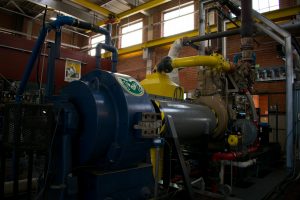Services
Research Test & Experiment Hardware
Well-designed, well-fabricated, and instrumented research tests can be critical for conducting high-quality research. The Colorado State University Energy Institute has extensive capabilities and services to help researchers with fabrication, controls and data acquisition, data collection, and other essential research-related activities. The facility maintains a machine shop and a fabrication shop (which accommodates welding, waterjet, and sheet metal work). The Energy Institute’s technical staff have experience with data acquisition systems such as LabView, and are available to accelerate the development work of Colorado State University researchers. Please contact John Mizia for more information.
Equipment & Instrument Core Facility
Housed within the Powerhouse Energy Campus are dozens of engines, dynos, exhaust gas analyzers, generators, load banks, thermal testbeds, and other testing equipment. All of the equipment and analytical instrumentation is available for Colorado State University researchers to use for conducting their research programs.



Equipment (partial list)
Currently Installed/Operational:
- Caterpillar G3304 7.0L 95hp Natural Gas engine
- Cummins QSK50 50.3L diesel, 2250hp @1900 rpm
- Cummins QSK19G, 1-6 LB NG 4-s 19L, 471hp
- Cooper-Bessermer GMV-4TF 1-4, Learn Burn 2-s, 140L, 440hp, Natural Gas Compression Engine
- John Deere 4045H, 175hp T3 Diesel Engine
- Waukesha F-2 CFR 0.61L Methane Number Engine
- Cummins QSB 6.7 L, 300hp T4 Final Diesel Engine
- Caterpillar CG 137-8
Formerly Worked On:
- Caterpillar G3304 7.0L 95hp Natural Gas engine
- John Deere 6068H, 250hp T2 Diesel Engine
- Guascor SFGLD 180 Single Cylinder 3 I NG Research Engine
Our specific areas of expertise
Industrial Natural Gas and Diesel Engine Testing – Our work is primarily focused on:
- Advanced ignition systems (laser, micropilot, pre-combustion chamber)
- After-treatment (SCR, 3-way catalysts, NSCR, oxidation catalysts)
- Fuel Injection Technology
- Dual fuel engine development
Fuels Analysis and Characterization
- Methane number measurement in CFR engine and fuel blending of alternative fuels
- Liquid fuels analysis: Corrosion, Acid No., Iodine No., Speed of Sound, Flashpoint, Cold Flow Properties, Viscosity, Metals, and Heating Value
- Waukesha FIT Ignition Quality Tester
Air pollution formation and control – emissions formation in internal combustion engines, two-stroke engines, and engines operating on alternative fuels, including biodiesel. Research methods include:
- Chemical kinetics
- Combustion analysis
- Optical diagnostics
- Computational fluid dynamics
- In-cylinder sampling
Toxic contaminants and hazardous air pollutants (HAPs) – a class of mutagenic and carcinogenic pollutants produced during combustion. We specialize in:
- Measurement
- Experimental Studies
- Analytical / Chemical Kinetic Modeling
- Mitigation
- Legislative Support
Please contact Kirk Evans for more information.
